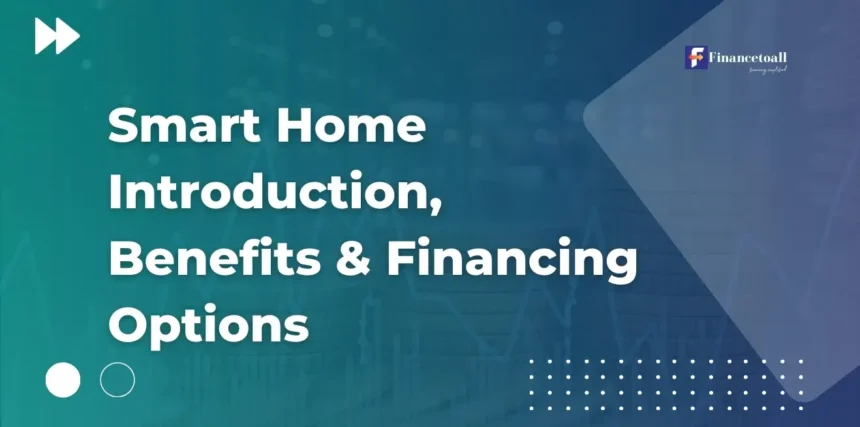Smart Home: Unlocking Financial Benefits and Transforming Modern Living
A smart home uses IoT (Internet of Things) devices to automate and control home functions like lighting, security, and heating remotely. These devices improve convenience, energy efficiency, and safety, often managed via smartphone apps or voice assistants like Alexa.
A smart home is more than a collection of cool gadgets. It’s a modern, connected living space that uses Internet of Things (IoT) devices to make everyday life easier, safer, and more efficient. While most people think of smart homes in terms of convenience like asking Alexa to turn on the lights there’s a strong financial side to this trend. From cutting utility bills to increasing property value, smart homes offer significant financial advantages.
But are smart homes worth the investment? What costs should you expect, and how can you maximize your return? Let’s explore how home automation systems, energy efficiency, and connected devices can transform your finances.
Key Takeaways: Smart Home and Financial Benefits
- Save on Bills: Smart devices like thermostats and irrigation systems cut energy and water usage, reducing bills by up to 30%.
- Boost Property Value: Homes with smart features sell for 3-5% more, attracting buyers seeking efficiency and convenience.
- Insurance Savings: Smart security devices lower home insurance premiums by 5-10%, saving hundreds annually.
- Affordable Upgrades: Loans, leasing options, and tax incentives ease upfront costs, delivering faster ROI on smart home investments.
- Future-Proof Your Home: Smart tech and renewable energy systems promise greater savings and potential income, like selling surplus energy back to the grid.
The Initial Cost of Building a Smart Home
Let’s start with the obvious: getting smart home devices installed comes with an upfront cost. This includes:
- Hardware Costs: Smart devices like thermostats, lights, and security systems can range from $20 to $1,000 each.
- Installation Costs: Professional setup may cost hundreds of dollars unless you opt for a DIY approach.
- Integration Platforms: You might need a hub like Google Home, Amazon Alexa, or Apple HomeKit, which typically cost $50–$200.
For example, installing a smart thermostat like the Nest or Ecobee costs around $200 upfront. But here’s the kicker—it can save you up to $180 annually on energy bills. That’s a return on investment (ROI) of nearly 90% within the first year alone.
Note
Start small. Begin with a few essential devices like smart plugs and lights, and expand over time to avoid overwhelming costs.
Long-Term Savings: Cutting Monthly Expenses
One of the most exciting aspects of a smart home is how it reduces your operating expenses, particularly on energy and water bills. Smart technology makes your home efficient, and efficiency means lower costs.
Energy Efficiency
Devices like smart thermostats, automated lighting systems, and smart appliances can significantly reduce energy consumption.
- Example: A smart thermostat learns your daily routines and adjusts heating or cooling to save energy. Studies show it can cut energy costs by 15%.
- Smart lights like Philips Hue or LIFX automatically dim or turn off when no one’s in the room, saving you even more.
Water Conservation
- Smart irrigation systems like Rachio monitor weather patterns and soil conditions to optimize watering schedules. This could save you up to 30% on water bills if you have a large yard.
Boosting Property Value with Smart Features
Homebuyers today love tech. Adding smart features to your home can increase its value and make it easier to sell. According to real estate experts, a home with integrated smart technology often sells for 3-5% more than comparable non-smart homes.
Why Smart Homes Appeal to Buyers
- Convenience: Buyers want homes that make life easier with voice-controlled devices or smartphone apps.
- Cost Savings: Features like energy-efficient devices are a huge selling point.
- Security: A smart home with advanced security systems is especially attractive in urban areas.
Example: A home equipped with smart lighting, a video doorbell, and a home security system sold 8% higher in a competitive market compared to a similar property without these features.
Insurance Perks: Lower Premiums for Smart Homes
Did you know that having smart devices can lower your home insurance premiums? Many insurance companies offer discounts for homes with:
- Smart security systems: Reduce the risk of theft.
- Water leak sensors: Detect and prevent water damage early.
- Smoke detectors: Improve safety and reduce fire risks.
For example, installing a $50 water leak detector might save you $100 annually on insurance premiums. Over five years, that’s a $500 saving for a minimal upfront cost.
Financing Options for Smart Home Upgrades
No need to be Worried about the upfront costs there are Several financing options can make smart home upgrades more accessible:
- Home Improvement Loans: Many banks offer loans specifically for energy-efficient upgrades.
- Tax Credits and Rebates: In many regions, energy-efficient devices qualify for tax incentives or rebates, reducing your overall cost.
- Leasing Models: Companies like Vivint allow you to lease smart devices, spreading costs over monthly payments.
Note
Check local government programs for rebates on devices like solar-powered homes or smart energy systems. These programs can significantly cut costs.
What Are the Best Smart Devices for Beginners?
Begin with affordable devices like smart plugs and light bulbs. Gradually add features like thermostats, video doorbells, and security cameras for a comprehensive smart home experience.
Rental Income: Maximizing ROI in the Rental Market
If you own rental properties, smart devices can make your home more appealing to tenants. Tech-savvy renters often prioritize smart apartments and are willing to pay a premium for features like:
- Remote control of lights and thermostats.
- High-end security systems.
- Efficient energy management systems.
For example, a landlord upgraded a rental property with smart lighting, a smart thermostat, and a doorbell camera for $1,000. The property now rents for $200 more per month, offering a quick payback period.
Security Benefits and Financial Protection
Smart homes are not just about comfort—they also enhance safety and reduce risks, which can have significant financial benefits.
- Surveillance systems: Smart cameras deter burglars and help in insurance claims.
- Smart locks: These ensure better control over who enters your property.
- Emergency alerts: Devices like smoke alarms and water sensors can send instant alerts, preventing costly damages.
Example: A $300 smart security system might prevent a break-in, saving you thousands in property damage and stolen goods.
Cybersecurity: Protecting Your Financial Investment
While smart homes offer plenty of perks, they also come with risks. Cybersecurity is a growing concern because poorly secured devices can be hacked. This could lead to financial fraud or stolen personal data.
How to Stay Protected
- Use a secure router with advanced firewalls.
- Regularly update device firmware.
- Invest in cybersecurity solutions like VPNs for added safety.
Cost Analysis: Spending $50 annually on a premium VPN is a small price to pay for securing your connected devices.
How to Secure a Smart Home from Hacking?
To protect smart homes from hacking, use secure Wi-Fi networks, strong passwords, and VPNs. Regularly update device firmware to ensure the latest security patches are installed.
Tax Incentives and Government Programs
Governments around the world are encouraging sustainable housing through tax credits and incentives. You might qualify for programs if you install energy-efficient devices like:
- Smart thermostats.
- Solar panels.
- Advanced energy management systems.
Example of a Tax Credit
In the U.S., the Energy Efficient Home Improvement Credit allows you to claim up to 30% of the cost of smart energy-efficient upgrades.
How Do Smart Homes Save Money?
Smart homes save money by reducing energy and water bills through devices like thermostats, smart lights, and irrigation systems. For instance, a $200 smart thermostat can save up to $180 annually on energy costs, offering a quick return on investment.
Future Trends in Smart Home Finance
Smart homes are evolving fast, and so are their financial implications. Here’s what the future might hold:
- AI-Driven Homes: Devices powered by AI could further optimize energy usage, cutting costs even more.
- Blockchain for Security: Blockchain technology might provide safer, decentralized networks for smart homes.
- Smart Grids: Integration with smart energy grids could help homeowners sell excess solar energy, creating new income streams.
Why Are Smart Homes a Good Investment?
Smart homes are a great investment because they reduce energy and water bills, increase property value, and lower insurance premiums. For instance, a $200 smart thermostat can save up to $180 annually on heating and cooling, offering a quick ROI. Additionally, homes with smart features typically sell for 3-5% more than traditional properties, making them an excellent choice for both homeowners and investors.
Conclusion: The Financial Power of Smart Homes
A smart home isn’t just about convenience it’s a financial powerhouse. From cutting monthly bills to boosting property value, the financial benefits of home automation are clear. And with options like tax credits, insurance discounts, and rental income, smart homes can be a game-changer for your finances.
Whether you’re a homeowner looking to save or an investor seeking high returns, the move toward smart living is an opportunity worth exploring. By making thoughtful upgrades and protecting your investment with cybersecurity, you’ll enjoy a connected, efficient home—and a healthier wallet.
Frequently Asked Questions About Smart Home
1. What is a smart home?
A smart home uses IoT (Internet of Things) devices to automate and remotely control functions like lighting, heating, security, and more. These devices communicate with each other and can often be managed through smartphone apps or voice-controlled platforms like Alexa or Google Home.
2. How much does it cost to set up a smart home?
The cost varies depending on the devices and features you choose. Basic setups with smart plugs and lights might cost $100-$200, while a fully integrated smart home with thermostats, security systems, and appliances can cost $2,000 or more.
3. Are smart homes worth the investment?
Yes! Smart homes offer significant financial benefits such as:
Reducing energy and water bills.
Increasing property value by 3-5%.
Qualifying for insurance discounts and tax incentives. Over time, these savings can outweigh the initial investment.
4. Can smart homes increase property value?
Absolutely. Homes equipped with smart features often sell faster and for 3-5% more than traditional homes. Buyers are attracted to energy efficiency, security systems, and modern technology.
5. How do smart homes help save money on energy bills?
Smart devices like thermostats, lighting, and appliances optimize energy usage. For instance:
Smart thermostats adjust heating and cooling based on your schedule, saving up to 15% on energy bills.
Smart lights turn off automatically when not in use, reducing electricity costs.
6. Do smart homes lower insurance costs?
Yes, many insurance providers offer discounts for homes with:
Smart security systems that deter theft.
Water leak sensors that prevent costly damages.
Smoke detectors that reduce fire risks. These can lower premiums by 5-10%.
7. Are there financing options for smart home upgrades?
Yes, you can finance smart home upgrades through:
Home improvement loans for energy-efficient devices.
Leasing programs offered by some companies.
Tax incentives or rebates for eco-friendly devices in many regions.
8. How do smart homes ensure security?
Smart homes enhance security through:
Smart locks that provide remote access and control.
Video doorbells and surveillance cameras for monitoring.
Alerts from smoke detectors and water sensors to prevent emergencies.
9. Are smart homes safe from hackers?
While smart homes are convenient, they can be vulnerable if not secured properly. To stay safe:
Use strong passwords and two-factor authentication.
Keep device firmware updated.
Use a secure Wi-Fi network or VPN for added protection.
10. What tax benefits can I get from smart home upgrades?
Many regions offer tax credits for installing energy-efficient smart devices like thermostats, solar panels, or advanced energy systems. Check your local government programs for details.
11. Can a smart home generate income?
Yes! If you rent out a property, smart features can command higher rent. Additionally, with smart grids and renewable energy devices, you could sell excess energy back to the grid.
12. How can I start building a smart home on a budget?
Start small with affordable devices like smart plugs and light bulbs. Gradually add higher-end devices like thermostats, cameras, and security systems as your budget allows.
13. What are the long-term financial benefits of a smart home?
Reduced utility bills through energy efficiency.
Increased property value and faster resale.
Lower insurance premiums.
Potential income from rentals or energy sharing programs.
14. What are the risks of investing in a smart home?
The primary risks are:
High initial costs, though these are offset by long-term savings.
Cybersecurity vulnerabilities, which can be mitigated with proper precautions.
Device compatibility issues, which can arise with older technologies.












